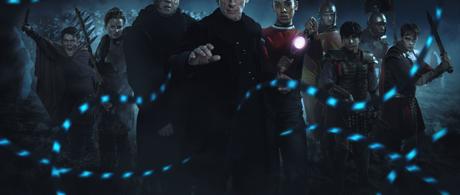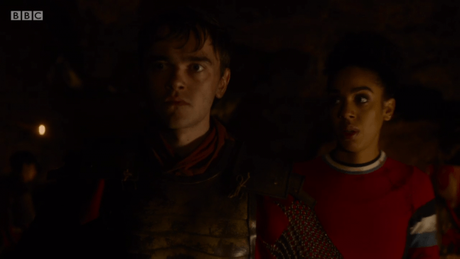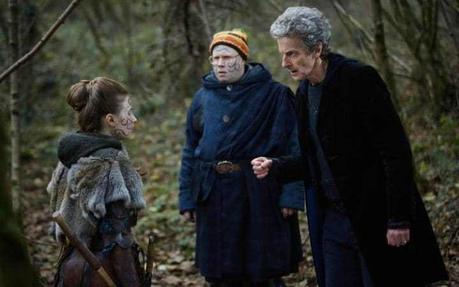
Well, that was a waste of time.
After "Empress of Mars" ended with a tantalizing and hotly debated final exchange between The Doctor and Missy, "The Eaters of Light" saw fit to ignore all of that until the very end, instead dropping The Doctor, Nardole and Bill into an uneven history-based adventure which felt too repetitive of what we've already seen this season. The team again had to unite two warring factions (ancient Roman warriors and tribal Picts) and sue for peace, and The Doctor, who was grumpier than normal for some reason, again had to declare his begrudging, but undying love for the human race. The episode felt like someone binge-watched Outlander and read a history book highlighting the mysterious disappearance of the Spanish Ninth legion, and then threw something together.
Here's what I liked and didn't like about the episode:
WHAT I LIKED
- Bill figuring out The TARDIS's auto-translation matrix on her own. It has truly been one of the more ingenious retcons of new Who that the reason everyone throughout time and space seems to speak English is because the TARDIS acts as a universal translator, no matter how far away The Doctor and his companions happen to be from the ole police box. By season 10, this is such an established part of the continuity I hadn't even noticed that no one had explained it to Bill yet. A scene of a companion freaking out over her ability to understand someone who claims to be speaking a different language even though she's clearly hearing it as English is not new; that scene not happening until the season is nearly over, however, is a different story. It added to Bill's ongoing discovery of everything Doctor-related, and gave her and The Doctor a fun, but brief back-and-forth later in the episode where all it was took was really a mere head nod and one-sentence explanation to confirm her suspicion that he was somehow responsible for it.
- Nardole going native. I really wanted to hear the end of his story about the people whose cultural customs include casual digesting of each other.
- The look of the monster. The striped light tentacles did the trick, elevating this from a ho-hum monster to a pretty cool one.
- Bill calling the Doctor out on his hypocrisy. Faster than you could type out a live-tweet nitpick while watching the episode Bill stepped forward to call The Doctor out on his hypocrisy over attempting to abandon his post as Vault guard to instead serve as the guard keeping the monsters from re-entering our universe and eating the sun. I liked that the episode didn't allow this obvious contradiction to pass without comment or criticism.
WHAT I DIDN'T LIKE

- Putting Missy at the end. "Eaters of Light"'s biggest sin might be that it felt wholly inessential, and we are too late into the season to have a filler episode, not when the prior one ended with an apparent promise of more action with Missy. Instead, she's stuck reading a book on the TARDIS the entire time, now acting as The Doctor's mechanic, kind of like he's granted her work release from prison but assigned strict restrictions on her freedom of movement.
Michelle Gomez is playing the hell out of every scene she gets, but there's nothing new here. Missy is expressing emotions and regret and tears, and The Doctor wants to but doesn't know if he can believe her. We've already seen this. At this late stage in the season, it would have been more interesting for her to actually go out on the adventure with them, or to do an experimental bottle episode focusing on her stuck in the TARDIS. See how she feels her time. Glimpse her reactions to watching The Doctor's Roman adventure through the TARDIS viewscreen. Find some way for her to maybe help The Doctor from the TARDIS.
The reason you don't do that, of course, is because you are trying to maintain the mystery over whether or not her rehabilitation is genuine or just a long con. We'll soon get our answers since the two-part finale is right around the corner, but this season-long build-up would have been more effective if by this point Missy was granted more screen-time than mere bookending moment repeating the same character beats.
- Car. One of Steven Moffat's tricks is to take the mundane and ordinary facets of everyday life - shadows, our need to blink, publicly displayed statues, etc. - and twist them just enough to make them newly terrifying or intriguing. This doesn't just happen in the episodes he writes, though. It's been a go-to move for many of the episodes during his run as EP. As such, it felt like a very Moffat-era Who thing to take the common noise made by crows and twist it into a song of remembrance for ancient Scottish warriors who saved the world. Every time they "caw" they are actually remembering the name of the Pict leader.
However, this felt a bit too corny, too big of a stretch. It's easier to take something as elemental as the dark and imagine there are monsters there; it's a much bigger ask to imagine that crows can and always have been able to talk and we've simply misunderstood the significance of their "caw" for centuries. Perhaps, though, I only object because I didn't particularly care for the rest of the episode or its characters. If I had I'm sure this emotional denouement with the crow would have seemed less objectionable and more emotional gratifying.
What did you think of "Eaters of Light"? Was I too hard on it? Let me know in the comments.

